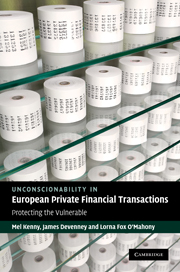Book contents
- Frontmatter
- Contents
- List of contributors
- Introduction: conceptualising unconscionability in Europe
- PART I Conceptualising unconscionability
- PART II Conceptualising unconscionability in financial transactions
- 8 Usury and the judicial regulation of financial transactions in seventeenth- and eighteenth-century England
- 9 Protection of the vulnerable in financial transactions – what the common law vitiating factors can do for you
- 10 Borrowers as consumers: new notions of unconscionability for domestic borrowers
- 11 Conceptualising and understanding fairness: lessons from and for financial services
- 12 Open the box: an exploration of the Financial Services Authority's model of fairness in consumer financial transactions
- 13 Conceptualising unconscionability in the context of risky financial transactions: how to converge public and private law approaches?
- 14 Conceptualising unconscionability in the post-Soviet era: the Lithuanian case of legal transplants
- 15 Bank loan contracts in Polish law: the legal position of the borrower
- 16 Financial contracts and ‘junk title’ purchases: a matter of (in)correct information
- 17 Kickback payments under MiFID: substantive or procedural standard of unconscionability?
- 18 Unfairness under the Consumer Protection from Unfair Trading Regulations 2008
- Conclusions
- Index
- References
10 - Borrowers as consumers: new notions of unconscionability for domestic borrowers
from PART II - Conceptualising unconscionability in financial transactions
Published online by Cambridge University Press: 06 August 2010
- Frontmatter
- Contents
- List of contributors
- Introduction: conceptualising unconscionability in Europe
- PART I Conceptualising unconscionability
- PART II Conceptualising unconscionability in financial transactions
- 8 Usury and the judicial regulation of financial transactions in seventeenth- and eighteenth-century England
- 9 Protection of the vulnerable in financial transactions – what the common law vitiating factors can do for you
- 10 Borrowers as consumers: new notions of unconscionability for domestic borrowers
- 11 Conceptualising and understanding fairness: lessons from and for financial services
- 12 Open the box: an exploration of the Financial Services Authority's model of fairness in consumer financial transactions
- 13 Conceptualising unconscionability in the context of risky financial transactions: how to converge public and private law approaches?
- 14 Conceptualising unconscionability in the post-Soviet era: the Lithuanian case of legal transplants
- 15 Bank loan contracts in Polish law: the legal position of the borrower
- 16 Financial contracts and ‘junk title’ purchases: a matter of (in)correct information
- 17 Kickback payments under MiFID: substantive or procedural standard of unconscionability?
- 18 Unfairness under the Consumer Protection from Unfair Trading Regulations 2008
- Conclusions
- Index
- References
Summary
Introduction
The classic situation in which unconscionable bargains and the wider doctrine of oppressive and unconscionable terms developed was where an impecunious borrower took a loan to ease his plight. Originally it was an heir to a landed estate who mortgaged his expectant interest to secure that loan, but it is now the domestic borrower who mortgages his or her home to fund either a loan for its purchase or to secure other liabilities. It is in this latter context that this chapter will consider the current statutory protections that have overshadowed the original equitable jurisdiction and introduced new notions of unconscionability to English law.
The idea of the statutory protection in this context is not new. Laws against usury, which initially outlawed and later controlled interest rates, date from the Middle Ages and were only abolished in the mid-nineteenth century. Statutory protection continued to control moneylenders but, as credit has become part of everyday life, there has been an overhaul of the statutory landscape governing the supply and control of credit to domestic borrowers. This legislation has abandoned the broad discretionary jurisdiction that justified intervention on the grounds of unconscionability and in its place has developed a complex web of statutory provisions and regulatory responsibilities, which protect the impecunious borrower as a consumer. It is not intended in this chapter to examine each of these measures in detail but to look to the broad sweep of this new statutory landscape.
- Type
- Chapter
- Information
- Unconscionability in European Private Financial TransactionsProtecting the Vulnerable, pp. 184 - 204Publisher: Cambridge University PressPrint publication year: 2010



